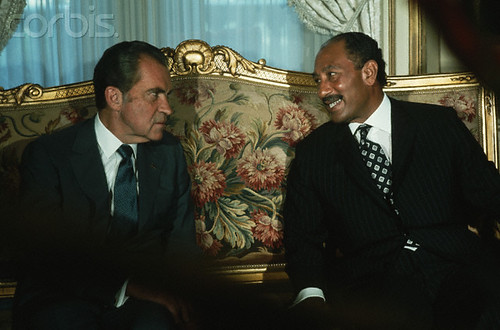The news that Egypt has arrested the brother of Sadat's assassin as he arrived at Cairo Airport is interesting:
Mohamed Shawqi el-Islambuli, brother of Khalid el-Islambuli who killed former President Anwar al-Sadat in 1981, was sentenced to death in absentia in 1992 for plotting from abroad to overthrow the state.
He was sentenced again in 1999 in a landmark trial of more than 100 suspected members of the Gama'a al-Islamiya movement blamed for a massacre of tourists in the southern city of Luxor, an embassy bombing in Pakistan and a series of killings and assassination attempts including one against Sadat's successor Hosni Mubarak.
[. . .]
Islambuli returned after Iran's government told him he must leave the country and could travel either to Egypt or Pakistan. After failed attempts to enter Pakistan and Turkey, he boarded a plane to return to Egypt, said [his lawyer Nizar] Ghorab.
Aside from geopolitical differences, the biggest obstacle to the resumption of diplomatic relations between Egypt and Iran has been that Tehran has hosted Islambuli and named a street after his brother. The question here is why did Iran decide to kick out Islambuli, and why was he left no choice but to return to Egypt where his arrest was certain? Could this be a prelude to the resumption of diplomatic ties (which would be perfectly normal, Egypt is one of very few countries — Israel, the US — which do not have diplomatic relations with Iran)? And does Iran feel compelled to do something it failed to do for years not just because Mubarak is gone, but rather because the regional setup is changing so quickly, with Syria falling apart, Hamas perhaps on its way to deserting Damascus and Tehran and Hizbullah post-Assad perhaps being more Lebanon-centered?

